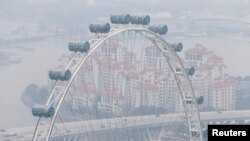If lawyer Jaya Gurunathan wakes up with a sore throat, he often knows the cause right away: the “haze.” Singapore blames the hazy air pollution that sometimes blankets the city on fires in the less regulated countries that surround it.
Gurunathan said that when air quality is especially bad, his eyes turn red and watery and he exhales black particles.
“I have sinus issues, so this makes it worse,” he said. “Sometimes it makes it hard to work.”
The pollution from fires in nearby Indonesia and Malaysia raise a foreign policy dilemma for the government: What rights does a nation have when other sovereign countries make decisions that harm it?
Blaming Indonesia, Malaysia
Singapore usually points the finger at Indonesia, where the sometimes illegal practice of slash-and-burn land to clear it for farming sends smoke across the ocean to both Malaysia and Singapore.
But this month, the black clouds have been coming from a bushfire in Malaysia. Singapore’s National Environment Agency said in Feb. 15 online post that some residents noticed odor and pollution days after the fire broke out.
“The Malaysian authorities have highlighted that activities are underway to put out the fire in the areas and cap burnt areas with soil to prevent fires from recurring,” the agency said.
Singapore, of course, can’t control the policies of its neighbors. But it is testing the limits on what a government can do to exert influence beyond its borders.
The Ministry of the Environment and Water Resources told Voice of America that it wants to support Indonesia’s “fire-fighting capabilities.”
“Singapore has consistently offered assistance packages to Indonesia over the past years to help combat possible land and forest fires,” a ministry spokesperson said.
Catching criminals
Some progress was made in September, when Indonesia became the last member of the Association of Southeast Asian Nations to pass the Agreement on Transboundary Haze Pollution. Environmentalists hope the pact will make it easier to catch criminals setting fires illegally, create early warning systems, and tighten control of land rights permits.
The Ministry of the Environment and Water Resources also said it had a “successful collaboration” with Indonesia to work on a master plan against illegal fires in Jambi province.
Social justice
Any solution to the haze would have to consider the socioeconomic forces behind the fires.
“There’s a lot of poverty, for example,” said Mariska Pagey, an Indonesian who lived in New Zealand and now works in Singapore. “What are we going to do about that?”
The Indonesians who light the fires to clear land often do so out of financial necessity, trying to make money by extracting resources such as palm oil.
“They don’t have any options, that’s where they live,” said Pagey, a procurement officer for a mining company. “If they want to make money, that’s what they have to do.”
Those social issues have to be balanced with public health. The haze has become such a problem of everyday life in Singapore that the government started a website solely devoted to pollution, www.haze.gov.sg. During severe periods, Singaporeans go online daily to check the PSI, or Pollutant Standards Index.




